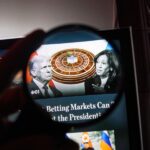Kalshi’s expansion triggers concern among US geolocation firms

Prediction market platfom Kalshi is causing unease among US geolocation providers that enforce location-based compliance for online betting companies, according to Sportico.
Kalshi, valued at US$5 billion, lets users trade event contracts nationwide under a Commodity Futures Trading Commission license without the location-tracking tools required in state-licensed betting.
Firms such as GeoComply, Radar and Xpoint fear the approach could erode a market worth hundreds of millions of dollars a year.
GeoComply supplies geolocation software to major operators including DraftKings and FanDuel, verifying a bettor’s exact position via GPS and network data. The technology ensures gambling occurs only in approved states and helps detect fraud or proxy betting.
Kalshi has resisted adopting such systems, arguing in court that the costs would cause “irreparable harm.” US District Judge Brenda Weksler in Nevada recently allowed regulators to seek evidence, moving the case toward trial.
The case has broader implications as FanDuel, through its partnership with CME Group, prepares federally regulated event contracts under Commodity Futures Trading Commission oversight.
The move could test how far prediction markets can expand before colliding with state gambling rules, boundary regulators say must be clarified as financial and gaming markets converge.
A GeoComply spokesperson said in an emailed statement to Sportico, “fraud prevention and compliance should never be viewed as a barrier to entry. They’re investments in consumer protection and long-term trust.”
Regulators have warned that Kalshi’s approach could blur boundaries between gambling oversight and federal trading exemptions, a line likely to shape the next phase of US betting regulation.
Charlotte Capewell brings her passion for storytelling and expertise in writing, researching, and the gambling industry to every article she writes. Her specialties include the US gambling industry, regulator legislation, igaming, and more.
Verticals:
Sectors:
Topics:
Dig Deeper
The Backstory
How a federal carve-out unsettled a state-built industry
Kalshi’s use of a federal derivatives framework to offer event contracts nationwide has jarred a decade of state-by-state controls that underpin U.S. online betting. State sportsbooks rely on geolocation software to fence wagers inside legal borders and block fraud; prediction markets like Kalshi operate under Commodity Futures Trading Commission oversight that does not require that toolset. That mismatch is at the heart of a courtroom push-and-pull now edging toward trial in Nevada, where a judge recently allowed regulators to seek evidence. The outcome will help determine whether federally supervised event trading can grow alongside, or around, the state rules and vendors that power mobile gambling today.
The stakes are large for location-technology providers that built their businesses on compliance mandates. If federally regulated event markets can scale without GPS-grade checks, the revenue pool available to geolocation firms could shrink and the compliance baseline could shift. The question, once mostly academic, has turned urgent as major sportsbook brands explore federally regulated event contracts of their own through exchange partners, testing how far event trading can expand before colliding with state gambling regimes.
For Kalshi, the bet is that federal market infrastructure, identity checks and surveillance common in futures markets can deliver consumer protection without duplicating state gambling controls. For state regulators and their vendors, the concern is that a two-lane system invites arbitrage, complicates enforcement and leaves gaps in fraud defenses. That tension frames the next phase of rulemaking as finance and gambling converge.
Ambitions abroad collide with patchwork realities
Kalshi’s global ambitions underscore the regulatory friction. The company has telegraphed plans to expand to as many as 140 countries, including China and India. Sportico reported those targets, and regional sensitivities, as part of a broader growth plan shortly after the company was valued around $5 billion. The path overseas is anything but straightforward: China maintains strict internet controls and a near-total ban on most gambling, while India has tightened curbs on online betting in recent years. Sportico also reported that Indian users still could not register accounts, suggesting the product had not launched locally. For context, see our coverage of Kalshi’s global push, including its selection of high-barrier markets in China and India.
The international picture matters to U.S. compliance debates for two reasons. First, firms navigating inconsistent laws abroad often centralize controls and risk programs that can be ported into U.S. operations—or expose gaps when frameworks diverge. Second, regulators increasingly compare notes across markets on fraud typologies, payment flows and consumer harms. Moves that appear permissible under one regime can quickly invite scrutiny when scaled across borders.
India’s AML turn raises the bar for online betting
India offers a case study in how fast the ground can shift. New Delhi is moving to bring online real-money games and betting apps into the ambit of the Prevention of Money Laundering Act, which would designate platforms as reporting entities with know-your-customer requirements and suspicious activity reporting. The Ministry of Finance is helming the plan, reflecting concern over unaccounted funds moving through gaming apps, as detailed in our report on the government’s intent to tighten controls under the PMLA. Read more on India’s prospective AML expansion and its implications for firms like Games24x7, Winzo and Dream11 here.
For a federally regulated prediction market eyeing India, AML obligations—if finalized—would add layers beyond licensing questions or state-level bans. Even if event contracts are positioned as financial products rather than gaming, the operational burden would look more like a fintech stack than a sportsbook, with onboarding, monitoring and reporting duties that mirror banks and intermediaries. That aligns with the broader thesis behind Kalshi’s U.S. model but complicates timelines in markets where definitions of “gaming” and “financial” frequently overlap.
Regulatory capacity gaps show up in Brazil
While India is tightening controls, Brazil highlights a different challenge: fragmented authority. The Central Bank told senators it lacks the legal power to regulate fixed-odds betting, even as it tracks massive payment flows—R$20 billion to R$30 billion in monthly deposits—moving through platforms. The bank is sharing data with the Secretariat of Prizes and Betting, but it cannot sanction operators under current law. Our coverage details the testimony from President Gabriel Galipolo and the constraints facing financial overseers in the sector; read more on Brazil’s jurisdictional limits here.
For companies pursuing event markets or betting-adjacent products, such gaps can cut both ways. On one hand, weaker jurisdictional clarity can speed market entry and payments integration. On the other, the absence of a clear regulator raises counterparty risk, future licensing uncertainty and the potential for abrupt policy shifts that strand investments. U.S. debates over whether geolocation is essential or optional echo that theme: the location of compliance responsibility—state, federal or shared—shapes cost structures and competitive advantage.
Supply chains and service hubs brace for change
Policy shifts ripple beyond operators to their service providers. In the Philippines, the gaming regulator pledged support for “special class” business process outsourcing companies that serve overseas gaming firms, even as it moves to shut down the POGO industry that had driven demand. PAGCOR stressed that SCBPOs cannot accept bets and face regular checks, positioning the sector as a jobs engine insulated from betting crackdowns. The commitment matters to international operators that rely on Manila for compliance, finance and design support. See PAGCOR’s stance on protecting high-skill outsourcing tied to global gaming here.
As prediction markets and sportsbooks recalibrate to regulatory expectations, their outsourced ecosystems—from identity verification to payments reconciliation—will have to track divergent standards. If U.S. federal rules evolve separately from state controls, providers could see a bifurcated demand curve: one set of tools for state-licensed wagering, another for federally supervised event contracts. That prospect underpins the anxiety expressed by geolocation vendors that have long sat at the center of the state model.
Enforcement climate sharpens governance risk
Headline investigations continue to remind boards that compliance choices carry legal, financial and reputational consequences. In the U.K., former GVC Holdings leaders, including ex-CEO Kenny Alexander and ex-chairman Lee Feldman, were charged in connection with a long-running probe tied to the group’s historic operations in Turkey. The case spans alleged conspiracy to defraud and conspiracy to bribe and underscores how authorities are willing to reach back years to test executives’ oversight of cross-border businesses. Our detailed account of the charges and first court date is here.
For U.S. firms weighing whether to adopt, adapt or resist traditional gambling controls as they expand into event markets, the lesson is straightforward: the line between financial regulation and gambling law is narrowing under the pressure of technology and scale. Decisions that seem defensible in one framework may be second-guessed in another, especially when consumer protection, tax compliance and cross-border activity intersect. That is why the outcome of the Nevada case—and any subsequent rulemaking—will reverberate beyond geolocation vendors to the broader architecture of how Americans speculate on real-world events.








